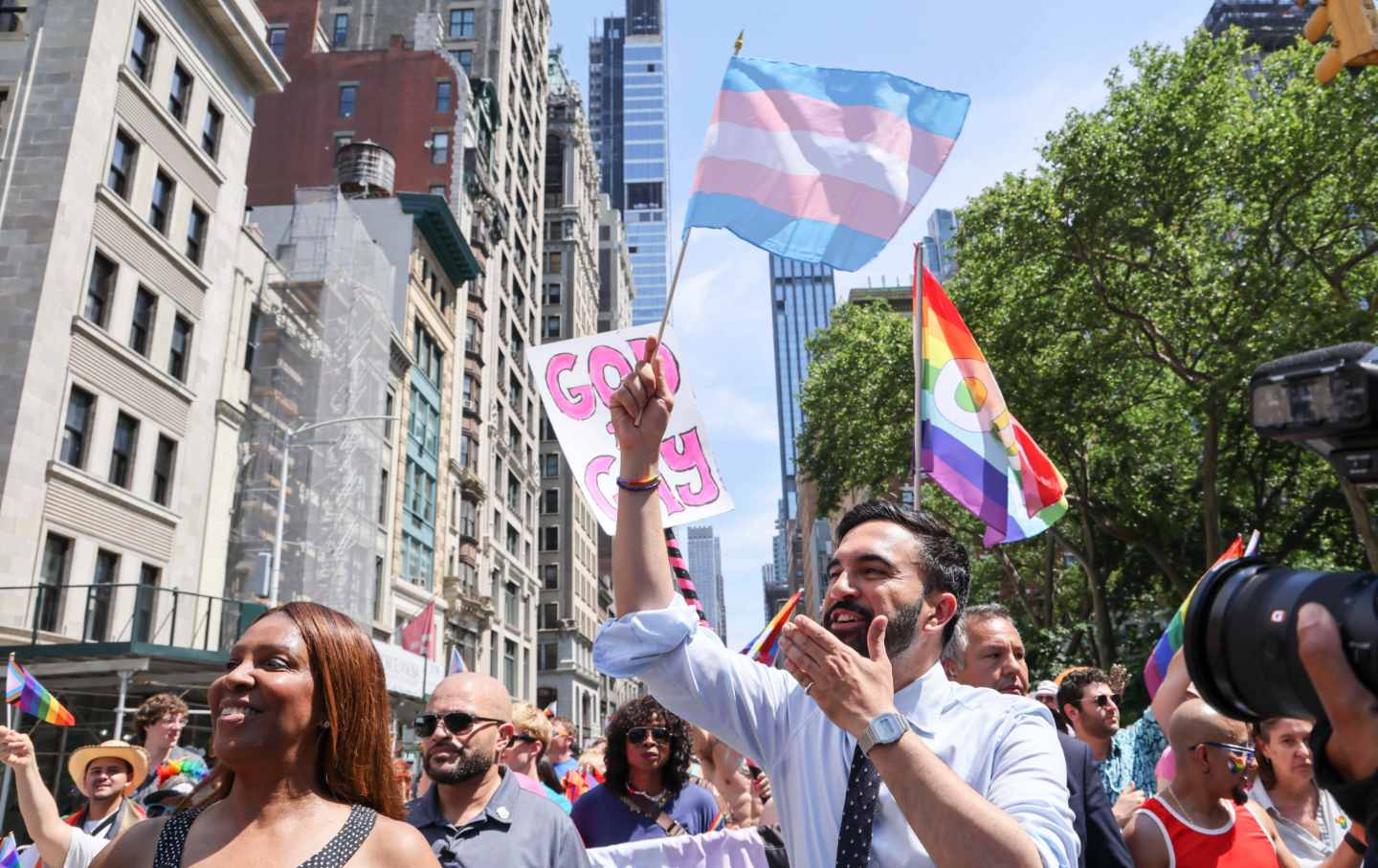Politics / November 7, 2025
Despite the attempts by so many in the party’s establishment to paint trans rights as a toxic issue, transphobia was soundly rejected across the country this week.

Zohran Mamdani waves the transgender pride flag during the New York City Pride Parade, on June 29, 2025.
(Alexandra Buxbaum / Sipa USA via AP)
The morning before Zohran Mamdani’s historic upset in the Democratic mayoral primary last June, the New York Post ran one of the endless number of pieces it has produced attacking the democratic socialist. This one focused on Mamdani’s proposal to expand and protect access to healthcare for transgender New Yorkers. “Zohran Mamdani wants to spend $65M on trans medical treatment—including for minors—if elected NYC mayor,” the headline blared. The Post has a long and unsurprising track record of inflating GOP talking points about trans people, our rights, and our healthcare. But on this, the paper was right.
Shortly after President Donald Trump issued an executive order threatening to pull all federal funding from any provider of gender-affirming medical care for patients under 19, Mamdani joined protests outside NYU-Langone, one of many hospitals around the country to announce that they would close their gender support programs for fear of losing access to much-needed Medicare and Medicaid funding. He then rolled out a proposal to “expand and protect gender-affirming care citywide,” including dedicating $65 million to replace the federal funding Trump would pull from providers, and also to set up city-based “access hubs” and new options for telehealth and virtual appointments.
It’s a remarkably robust proposal, far more than any major Democratic candidate in recent memory has put forward, and easily the most responsive to the number-one worry transgender people have about life under this administration—namely, access to the healthcare that serves as the foundation of our entire lives. Its $65 million price tag is also equivalent to just 0.06 percent of New York City’s 2024 budget (despite all the Republican crowing about “taxpayer-funded sex changes,” it’s remarkably cheap to keep 0.8 percent of the population happy and healthy).
Most people—certainly most people who aren’t trans—probably have little awareness of the Post’s attack, or even of the proposal itself. That’s in part because New York City is a very progressive place, and Mamdani’s chief opponent, Andrew Cuomo, had himself touted his track record of signing LGBTQ nondiscrimination bills into law. But it’s also because Mamdani’s broader agenda—laser-focused on affordability and the everyday lives of New Yorkers delivered via comprehensible, concrete policies—leaves him less vulnerable to the politics of forced scarcity that many anti-transgender attacks rely on.
The central goal of much anti-transgender rhetoric is to make cisgender people believe that their interests and trans people’s interests cannot be met at the same time. It’s not just the accusation that trans people are different or weird or creepy; it’s that our rights, our healthcare, and our well-being must come at the expense of your well-being. As the infamous ad from Trump’s reelection campaign put it, transphobes want cis people to think that someone who cares about “they/them” could never be for “us.” It fits neatly into the central thesis of Trumpism—that someone else’s suffering will be your gain. It also feeds into the portrayal of the Democratic Party as feckless, effete, and obsessed with the abstractions of identity.
For any politician facing them, there are two ways of handling these attacks: by promising to care less about trans people or by promising to care more about everyone. If you are not responsive to the needs and interests of a broad coalition of working people, you can be more easily caricatured as dedicated to the interests of some nefarious (and often racialized) other. But if you do have a compelling vision for how to improve all people’s lives, the fact that not all of those people are the same carries less weight. It is true that many Americans would rather starve than share a table with someone they view as less deserving or too deviant from their own experience. But it’s especially true if all that’s on the menu is scraps.
In the year since voters reelected Trump to the presidency, it has become conventional wisdom among Democratic strategists and pundits that the party’s support for transgender people was too heavy a political burden to carry and helped send Trump back to the White House. Billionaire-backed groups like the Searchlight Institute—founded by former John Fetterman aide Adam Jentleson—specifically decry the influence of LGBTQ rights activists for leaving Democrats vulnerable to Republican attacks, and centrist troglodytes like Rahm Emanuel have let no podcast invite go to waste in their quest to blame transgender people for the faltering image of a party they themselves have been the face of for more than a decade. California governor and all-but-declared 2028 presidential candidate Gavin Newsom has perhaps gone the furthest to distance himself from transgender people’s rights, vetoing a measure passed by the California State Assembly that would allow transgender people to maintain a 12-month supply of prescription hormones (at a time many are rationing their medication for fear of what the political future might bring). Far more than rhetoric or intraparty fighting, these efforts are having material consequences on trans people’s ability to survive the next three (at least) years—even though, as this week’s elections showed, it’s far from clear that trans rights is the electoral poison that Newsom and his allies insist it is.
Take, for example, the gubernatorial races in Virginia and New Jersey. Both GOP candidates—Virginia Lieutenant Governor Winsome Earl-Sears and New Jersey State Assemblyman Jack Ciattarelli—staked their campaigns on the same scapegoating and dehumanization that seemed to fuel Trump’s victory, with Earl-Sears in particular airing nonstop ads depicting transgender people as vile predators and a self-admittedly “boring” Democrat like Abigail Spanberger as our entitled enabler. Spanberger—who focused her campaign on electricity prices and Trump’s DOGE-backed war on the civil servants that dominate the economy of northern Virginia, and resolutely declined to support the imposition of statewide anti-trans laws—won handily in the face of these ads, with voters actually preferring her approach to transgender rights by 12 points.
Even before 2024, transphobia as electoral strategy stood on the shakiest of foundations, with most Republicans who ran full-tilt on the issue failing in competitive races without Democrats needing to sacrifice rhetorical or political ground. Indeed, voters in New York added protections for transgender people to the state Constitution in 2024 by a wider margin than they voted for Kamala Harris.
It’s tempting to read too much into any one election or to transpose the politics of one region onto the very different politics of another—what worked in Brooklyn probably won’t always fly in Roanoke, at least not overnight. I’ll also resist the urge, indulged in by many, to swear that I have the secret key to the Democratic Party’s future and they can secure majorities in Congress and the White House with this one neat trick.
But Tuesday’s results only bolster an already clear truth: Transgender people’s inclusion in the Democratic tent is not the cause of the party’s woes. Nor will throwing us overboard alleviate them. The suggestion that it would, proffered by many of the same people who failed to prevent Trump’s return to the White House, strikes me as an opportunistic blame game, a concerted effort by the people with the most power to scapegoat the people with the least for their own failures.
It is true that public opinion has soured on transgender rights—and, by proxy, transgender people—over the last few years. But considering what we’re up against, it would be remarkable if it hadn’t. The RNC alone spent $222 million on anti-transgender advertising in 2024; that’s more than four times the entire annual budget of the Human Rights Campaign, the largest LGBTQ rights organization in the country. Now multiply that across every year for the past decade, when trans people became the main character in Republican fever dreams and literally thousands of bills flooded statehouses targeting us. Then add in the seemingly impervious conventional wisdom among Democratic elites and their allies in the media that trans issues are too extreme to touch. Is it any wonder that this all had an impact?
Transgender activists have tried to push back with what we have, primarily focused on persuasion, storytelling, and resetting the frame about us around shared values. But we’ve simply been swamped by the scale of what we’re up against, steamrolled by the same legal machinery that overturned Roe v. Wade and threatened with violence and terrorism, all while being treated like a priority for most of our enemies and an afterthought to many of our friends.
The stakes of this asymmetry have only grown more dire as more of us lose our healthcare, our speech, and our ability to exist as ourselves in public life—an effort Trump is trying to take national. Now greenlighted by the Supreme Court, bans in over half the states prohibit transgender youth from accessing hormone treatments so essential to their well-being, forcing many families to flee the only homes they’ve ever known to maintain access to care. Three years after Texas threatened families of transgender youth with removing their children from their custody, the president has declared the healthcare they need to live “abusive” while subpoenaing their medical records, coercing hospitals into dropping their care, and threatening to criminalize our advocacy under the label of “transgender ideology.” Republican members of Congress have called for our mass institutionalization, and their activist base calls for us to be eradicated from public life entirely.
When I look at these attacks, I see no line that Republicans won’t cross. When I look at Democrats, I see no line they’re willing to draw.
While Zohran Mamdani ran and won as a Democrat, he did so against the will of party leadership and the liberal establishment—the same groups now trying to distance themselves from trans people. Instead, he made his case directly to the people. This is no accident. In the face of liberal recalcitrance, institutional selfishness, and capitalistic greed enabling Trump’s destruction of so much, it is the people that have stood the strongest against him. There’s an old slogan from ACT UP, the radical queer movement born in New York City in the wake of the AIDS crisis, that could just as well serve as the Mamdani Doctrine: “We’re all we’ve got and we’re all we need.”
I am exhausted with begging for help and pleading for others to recognize transgender people’s humanity. I’m also exhausted with the shallow brand of identity politics removed from the material concerns of most people–including trans people–adopted by the mainstream of the Democratic Party in the 2010s when it seemed a useful wedge against progressives like Bernie Sanders and Alexandria Ocasio-Cortez. As Judith Butler told El País earlier this year, “Identity is a great start for making connections and becoming part of larger communities. But you can’t have a politics of identity that is only about identity. If you do that, you draw sectarian lines, and you abandon our interdependent ties.”
It is exactly those interdependent ties that Mamdani won on and that our political future depends on. The politics of forced scarcity being sold by Trump and seemingly bought into by many Democrats is a myth deeply ingrained in our politics, our communities, and our culture. Rewriting it is not simply the work of rhetoric, talking points, and being open to disagreement. It’s also the work of changing how people experience politics to begin with, and showing them their freedom and dignity need not come at the expense of someone else’s. And what I see in Mamdani’s campaign is not only a promise of solidarity with a marginalized group I happen to be a member of. What I see is a promise that nobody will have to do that work alone.
Gillian Branstetter
Gillian Branstetter is a writer and media strategist based in Washington, DC.






